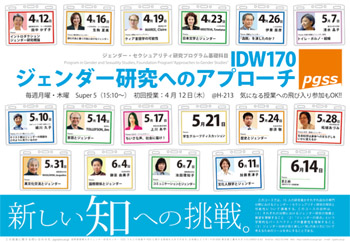Yuki NAGAO
Undergraduate student, ICU
【The article below is the same as the article that appears in the ninth issue of the CGS Newsletter.】
 Many people who have only known me since I started university are surprised when I tell them that, in high school, I had demonstrated little interest in sexuality, let alone gender. In fact, I used to be quite vocal in my opinions about things like how a girl should at least be able to cook and sew. I think I was caught in an idee fixe that I had to be a “good girl” who is liked by everyone. At that time I had no idea that I was merely acting the part. Even though I had certainly felt restricted in some way, I tried hard not to be conscious of it.
Many people who have only known me since I started university are surprised when I tell them that, in high school, I had demonstrated little interest in sexuality, let alone gender. In fact, I used to be quite vocal in my opinions about things like how a girl should at least be able to cook and sew. I think I was caught in an idee fixe that I had to be a “good girl” who is liked by everyone. At that time I had no idea that I was merely acting the part. Even though I had certainly felt restricted in some way, I tried hard not to be conscious of it.
My first encounter with gender studies occurred quite by chance through a General Education class in my sophomore year. I will never forget the tremendous impact that it had on me. The realization that all those subconscious, pent-up emotions within me already existed as an academic field of study, truly altered my life. It made me aware of how restricted I had felt in trying to fit myself into a socially-imposed mould. Studying about gender and sexuality enabled me to understand and consciously re-evaluate how and why I felt about things. While this process is at times difficult, it is most definitely fascinating and rewarding.
My reason for enrolling in the Program for Gender and Sexuality Studies (PGSS) was not only because I wanted to study more about gender and sexuality, but because I wanted to research theology, the subject that I had originally intended to study at university, from the perspective of gender. Although it is said that there are greater possibilities for interdisciplinary research at ICU as the departments are not so strictly segregated, courses that aren’t considered to be directly related to your major still tend to be relegated to a subsidiary position. I did not want to choose between a major in theology or gender, with either one as a sub-major. Thus, I chose to partake in PGSS because it enables me to study theology from the viewpoint of gender.
The students in PGSS all share the common perspective of gender, but our individual research interests are diverse, ranging from literature to labor or sports. Thus, in contrast to the usual university seminars and classes, in which students share a common topic such as religion or politics, the PGSS gathers those with the same perspective. I believe that this facilitates a truly interdisciplinary exchange of experiences, debates and knowledge.
Yet, even at ICU, in classes which are officially unrelated to gender or sexuality (although this is in reality not possible), when a person makes a statement from a gender perspective, she or he is often stigmatized as a disharmonious, pesky feminist (although I have no objection to the label “feminist” by itself). It is a battle that I cannot fight alone and in this regard, PGSS has been a source of empowerment for me.
I was once told that the study of gender entails a biased perspective, a view of the world from colored glasses. This may be true, but is it really possible to take off our glasses? At least, I think that we would not even think to remove our glasses if we weren’t even aware that we were wearing them in the first place. Before I discovered gender studies, I was wearing a pair of glasses that did not suit me and I had not even realized it. As it is, today, I have successfully replaced my former glasses with a pair that can see much further and more clearly.